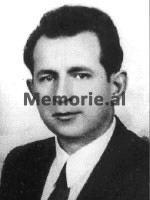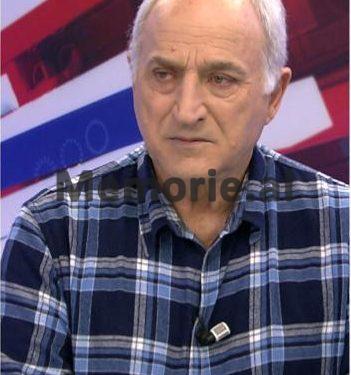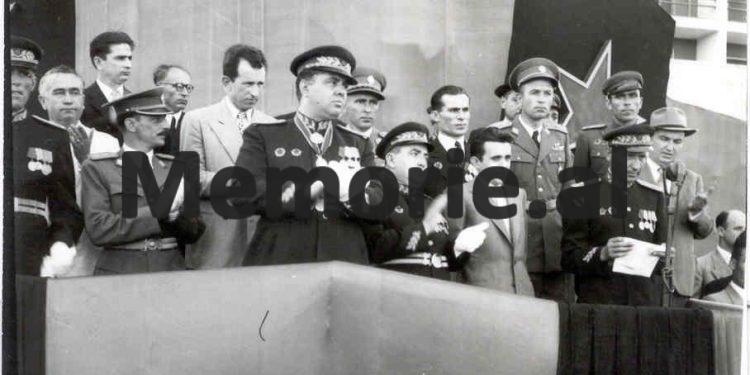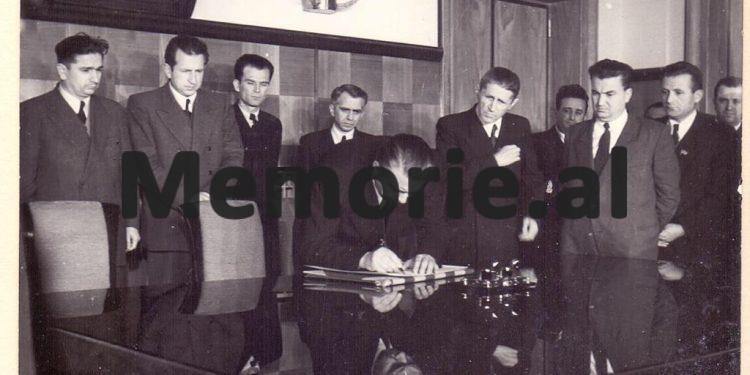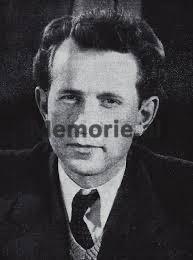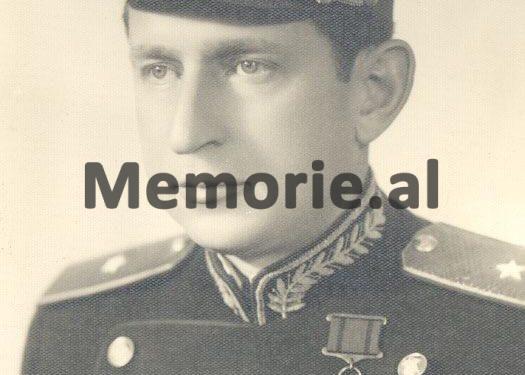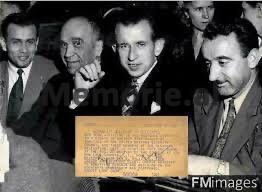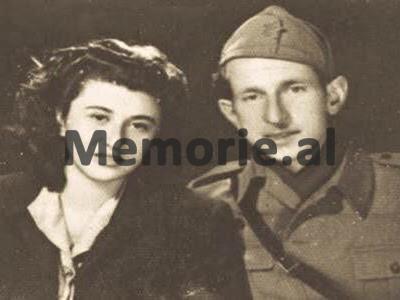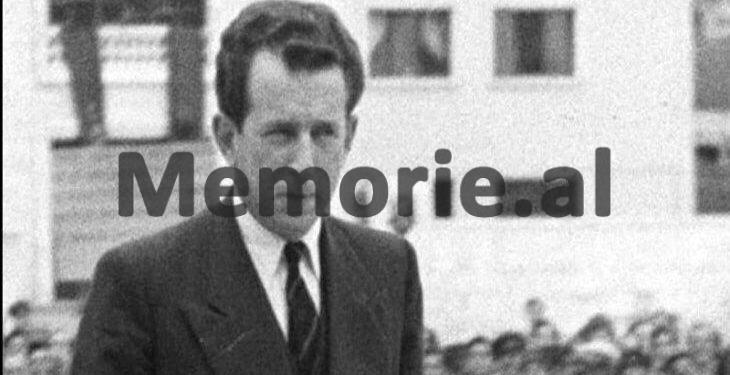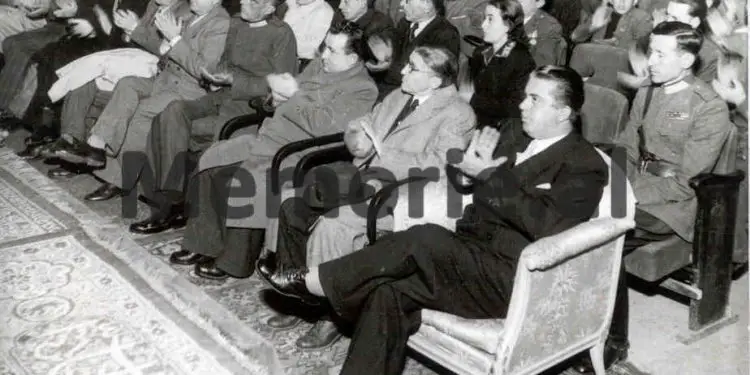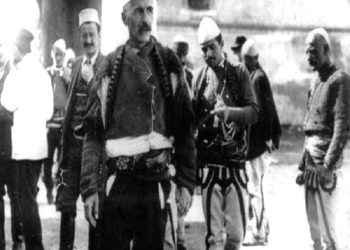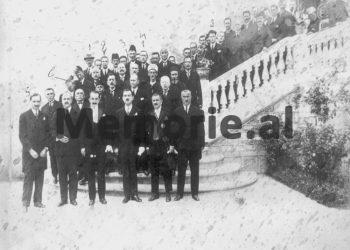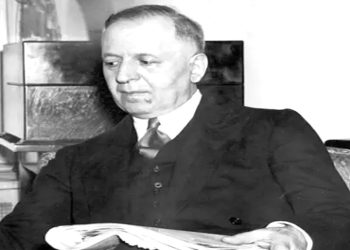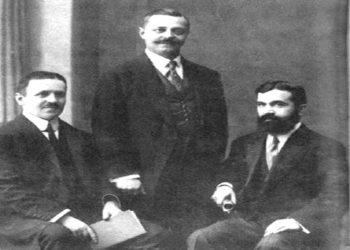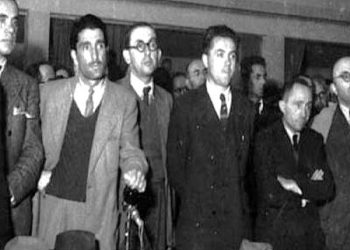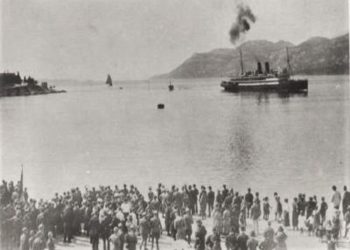By Agim Jakova
Who ordered the elimination, Enver or Mehmeti?
Memorie.al/From the end of 1956, until the break with Moscow, Enver Hoxha’s chair was swinging in the air. In all communist countries, Stalinist leaders were honored and condemned. In addition to trying to find a branch to grab, in her absence, Enver, at the same time with more preoccupation, thought of a smoother fall from the chair. He preferred a substitute from the trusted nomenclature, rather than an opponent substitute hit by him. From the contribution and popularity, candidates could be Mehmet Shehu and Tuk Jakova. In relation to Moscow, Mehmeti was the most preferred. The fact that Mehmeti had studied in Moscow and was present in the Russian Legation, while Tuku at all, speaks convincingly. In the state line, Mehmeti was unbeatable by Tuku and by no one. Mehmeti and Tuku respected their contribution, bravery and sacrifices in the war. The ambitions for protagonism and their characters were diametrically opposed.
Tuku, human, just and amnestying; Mehmet, wild, radical, active and quality military. The ambition for protagonism is human when done with human means. Mehmeti versus Tuk did this, using power as a tool and this tool is human. Mehmeti and the rest of the nomenclature had no malice to the point of annihilation for Tuk, on the contrary. Mehmet felt competed by Tuku, only on party roads. Thus, Mehmeti felt comfortable with Moscow and Tuk, so there was no reason to physically eliminate Tuk. Tuku, refused and opposed enverism, while Mehmet bent down and served until his end. Both, one by one, Enver eliminated. The two together eliminated Enver. At this point, the individual provincial and perhaps religious mentality, unfortunately for them, could not bring about telepathic understanding. From the album of the State Archive, published on the occasion of the 70th anniversary of the Liberation, in the establishment of the Communist Party, on November 8, 1941, Tuku was elected organizational secretary (not the first secretary), while Enver was elected finance secretary. Tuku never mentioned this fact and merit.
How did the story happen that Enver came out on Tuk?! This is explained by his servility towards Miladin, the elbow fight, where Enver was a professional, the sale of Kosovo, Serbs and the physical elimination of anti-Serb and patriotic militants. Enver, after securing the absolute influence on Miladin, made three members of the Shkodra Group, who were a potential obstacle to his goal, to be sent for activity in the most dangerous areas, with many possibilities of physical elimination by the occupier, or by his. This is what happened to Vasil Shanton, Qemal Stafa, while in Tuku, fate acted. This project remained dependent. From 1948 to 1951, Enver was the party’s first secretary and prime minister, while Tuku, cadre secretary and deputy prime minister. In all his activity, 1941 to 1985, Enver eliminated and physically destroyed the most patriotic, most capable, most contributing, most aspirational, most idealistic nucleus, since the dedication and sacrifice will hardly be repeated for Albania. Surprisingly, they all turned out to be enemies linked to foreign agencies. For the most part, he eliminated it with trials, often mounted.
A small number, meant as undeclared enemies, were eliminated by the State Security, with an alibi, “suicide or heartbreak”, after drinking a cup of coffee, or a glass of brandy or cognac. This means poisoning. If history, ever, will try to uncover the truth, it is enough to turn the picture created by Enver upside down. Do dalin çudira. By the time Tuk was arrested, two political bombs had exploded on Enver. One with the protagonist, Tuk and Bedri, in the plenum of April 1955, while the other from the party base, in the Tirana Conference, in June 1956. The pulse of the base was seen there. Through harsh criticism of the line followed by Enver and his cult, the rehabilitation of Tuk Jakova and Bedri Spahiu was demanded. Above all, in the following, on Enver’s head would stand the sword of Damocles, Moscow and parent. Tuku, with his political experience, described Enver’s political profile, with great foresight: war”. Shortly afterwards, Enver would aim to become a world figure by challenging the two superpowers, without having power and name. Megalomania or stupidity? Tuku stepped on the callus very early. The political atmosphere inside and outside was stinking for Enver. For Tuk, the remaining attempted “scorched earth” project had to be used. The fact that Tuk’s death was reported directly to Enver at the meeting shows that he is the one who ordered it. If Mehmet had ordered it, it would have been reported to Mehmet and he would have told Enver about it. Success along with the joy, which gives the positive result of the act, are reported to the commanding superior with the devotion of the marathon runner.
Mafia act of poisoning!
The physical elimination of Tuk Jakova had been planned since his arrest. The request for capital punishment, the investigative process for lack of evidence could not fulfill. Tuku was sentenced to 20 years in prison, followed by the relevant derivatives. Thus, the project remained pending until the nearest opportunity case. Unfortunately for him, the case came quickly and in a timely manner. After a year and a half in prison, on August 17, 1959, at the exit for ventilation, in the morning, appendicitis crises begin. A formal visit was made, he was calmed down and locked up in the dungeon where he was staying with his accomplice, Mr. Bedri Spahiu. For two days, knocking hard on the door with clogs for help, Mr. Bedri, theu nallanet. “I obey,” said Mr. Bedri, “because they decided to let him die in the cell”. So great was the anger for him. Enver’s callus, which Tuku stepped on, would have eternal pain in his sedra.
Specialists at the center, convinced that Tuk’s hope for survival had been extinguished, thought that it was better for the prisoner to die in the hospital than in a cell, otherwise it would be a banal crime. Tuku was taken to the hospital from the prison to “Mine Peza” today, at “QSUT”, at midnight on August 19, 1959. The distance from the prison to the hospital is about 1.5 kilometers. At that time, there were no cars, no urban cars, no traffic lights. This distance, on foot, is done in 15-20 minutes. Who did this delay of over 58 hours serve?! The operation was performed at midnight in the Civil Hospital (at that time) No. 2, today “QSUT”. After the operation, he was sent to a room on the ground floor of the same hospital, which was used for prisoners. There were political and ordinary prisoners in that room, kept separate. In that room, days ago, was placed a political prisoner, Mr. Nikoll Zagorjani, from Velipoja in Shkodra. Mr. Nikolla, coexisted with Tuk, as a friend, as a witness, until his last breath. Nikola shows:
– “The prisoner was brought to the room and placed on the bed next to me, near the window. He was conscious, but the anesthesia had not yet come out. The window was barred. In addition to the guard at the door, with the arrival of this prisoner, a guard was added to the window. In the morning I approached him, greeted him and introduced myself. He told me: – I am Tuk Jakova. The patient was slowly recovering. “His gigantic physique, seasoned over two years of survival in the mountains, in nature, triumphed.” The news they wanted was not coming to the center. Thus, on August 23, 1959, they went to see the situation. They learned that Tuku had to leave the hospital. He would either go to the prison hospital or go back to prison. The second attempt at physical elimination had failed. Returning the prisoner to the center lap (in prison) made physical elimination impossible. This act had to be left in the “lap” of the white T-shirts of the Civil Hospital and together with it, the main thing: – responsibility.
Nikolla says: – “On the morning of August 24, 1959, the guard informed Tuku that they were looking for him and that he should accompany him. As time went on, Tuku returned. It trembled a little. I asked him: – What is this Tuk here? – ‘A couple of friends from the Ministry of Interior had come to meet me’ – What did they say? – ‘We chatted. They were interested in the family, then they remembered the time of the war and other conversations’ – Did they take you out? Yes! – What? –Cognac! –A pive? – Yes, beer! – They have mine, you coward! – No mor ……, my friends did this job for me? They told me at the beginning. Tuk, are you not drinking a glass with us? I objected, I am operated, I said, I am afraid that it will hurt me: – You are right, how to take a shower, – they told me. We continued the conversation. They had mushed their glasses and the metun part in the bottle, they had put a glass upside down to stop them. Stick with them, it was a small tray with 2-3 more glasses upside down. The jokes and gossip are amla, once, I took the glass, looked at it carefully, here clean, musha and kadal-kadal, I drank it. As I drank the glass, after a while they left, congratulated me with the best wishes and we said goodbye.
Gradually, the pain and fever started, and the tremors increased. ‘
The pain intensified as Nikola held her in his lap and squeezed her stomach. Here, Tuku was convinced of the suffering he received from trust. Once he went to the bathroom and there, then he fainted. The nurse and doctors were called, they came and took him by the hand. Although the pain subsided somewhat, from the high temperature, he occasionally spoke erratically. He was also visited by doctors of other specialties. One of them was the honorable psychiatrist, Mr. Ylvi Vebiu, who testifies: – “I had nothing to do but relieve his suffering. In a moment of calm, he said to me: – They are wrong to go against world developments. “Youth near,” says Mr. Nikola, ‘I prayed for him and sang the song that the people of the province of Shkodra had raised for his bravery. When strong seizures gripped him, I lowered him to my lap and squeezed his abdomen. Tuku was stuttering through his teeth: “You did this to me too, take the dog”! Tuku, did not deconstruct the macabre act. Instead of sensational deconstruction, he bequeathed to the children. In a fatal and dramatic moment, with greatness and responsibility for the family, he played the last card. Death could not be avoided. The Commander could not be challenged. How can I relieve the family? Reason dictated silence and so it did. The election bore some fruit. “Once the right leg was held up by the pain and the right hand was on the abdomen,” says Mr. Nikola, ‘fell. Tuku passed away on 26.08.1959 at 23:30. He suffered for two and a half days. I took care of my eyes and mouth and did the occasional religious service. The officer guard, who was at the window, was cut in the face. He was sorry “, concluded Mr. Nikolla.
Analysis for medical expertise
Tuku underwent an autopsy and then an expert examination by three well-known doctors, for the causes of death. Death was christened “acute peritonitis.” The main reason was the delay in arriving at the hospital. Another reason was the low dose of medication and medical indifference after surgery. The operation was performed correctly, according to the classic rule. The victim himself was a little guilty, because his body did not have the right resistance, “to resist the poison”. A ruptured vein was found in his heart, “which had not brought him death.” This vein shows how strong the crises have been and how much he has suffered, until his soul came out. This “very professional expertise, with the names of very competent doctors”, mainly blames the prison directorate and the hospital, which treats enemies with another standard without care. However, the responsibility lies with the state. True, this responsibility belongs to the state, but what does this expertise mean or sub-show, with a cold look, not medical, but penetrating of the common man, knowledgeable of the deeds of the infamous and macabre organ of dictatorship?! The main responsibility in this expertise falls on the prison directorate.
Is this swallowed?! In that centralized system, to whom did he keep acting on his own initiative? Based on this, this responsibility automatically passes to the Ministry of Interior. Here there was a specialized cell, where orientations were given, the script was created, the execution was done in the most professional way. Then the traces were covered or removed, also professionally. The last two acts always become the object of analysis, where light is often shed on the truth.
The team that carried out the cold execution consisted of three people. By protocol, the security action team consisted of two people because they had to supervise each other. The third person was without a doubt the doctor of the Ministry of Interior, who would see and visit the prisoner, who would be released from the civil hospital soon. It was this doctor who hospitalized Tuk. The presence of this doctor, justified the use of the director’s room, otherwise the State Security officers could not claim this privilege and use the office as a ground for the act they would perform.
The task of the third person corresponds to Llambi Ziçishti. The names of the other two persons are still unknown. Tuku took them with him. This act committed in a corner, inside the territory of the Civil Hospital, away from the eye and attention of the devil himself, tactically removes from responsibility the institution of crime, leaving it at the door of the humane institution, the hospital. Surely, Tuku, entered that door, from where, with or without breath, he would not come out alive. The decision of annihilation left hanging, coming out of the source, had no better time and other occasion. Every link in the chain of crime knew only the adjacent link, but never the source. If Tuku had not drunk the cognac with poison, the Security people would have strangled him and thrown him out of the second-floor window, accompanied by the corresponding alibi, suicide, he was thrown out of the window. That is not enough. In the medical expertise there is a gap for the health progress of Tuk, from the exit of the operating room, to the moment of poisoning.
Medicine performed the operation and cleaning accurately, so says the expertise. The fact that the patient was well five days after the operation, went to the death chamber, quite far away, one floor above, with his feet and returned, as well as the decision of the best surgeons, with more experience, for him discharged from hospital; speaks of normal condition, without risk of recurrence. Who caused this gap, negligent medicine, or the alibi of the mafia hand?! But why this? Simply to transfer responsibility for death and authorship of the crime. Tuku in the death chamber, in the territory of the white T-shirts, became pregnant with death and with it on his back, descended the stairs with a sigh, trembling a little, to go and breathe, after two and a half days, in the “lap” of white t-shirts. “Bravo” criminals, for the act and the alibi! If medicine had been used as a lever, a false operation would have been enough to eliminate Tuk.
The use of medicine in this case, would make the secret come out of the guarantee. It was therefore long kept in the cell until the hope of survival was scientifically extinguished, leaving responsibility to medicine and securing the secret administration with the most reliable alibi. “Medicine did its best to save him”; said in the Interior Ministry, was given the order. It was impossible. This really happened, because in addition to surgery, doctors from other specialties, including the neuropsychiatrist, took part in rescuing him, because from the high temperature, there were cases when the patient spoke wildly. In these tragic and fatal moments for the victim, the crime cell felt excited about the opportunity provided by this act towards promotion. Did the deserters know that for the deeds, before and after this act, one day they would be sacrificed, to erase the traces!? On the other hand, at the same time, the prison administration cell in the Ministry of Interior, for fear of responsibility, sounded the alarm, to make it impossible to save Tuk.
The senior State Security officers came and saw Tuk’s serious condition, why?! Did they want to make sure that Tuku would die, or give orders, to become helpless to save him?! Did they want to learn that Tuku understood the poisoning, or to create the human impression, to eliminate any possible suspicion in the hospital environment?! We made Enverist! Can it be accepted that the gap in the patient’s card, for the progress of the disease, was caused by medical negligence?! /Memorie.al
Continues in the next issue




